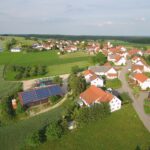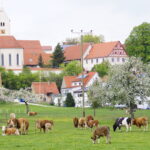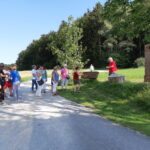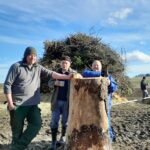Ehinger Alb, Baden Wurttemberg, Germany
The six villages Altsteußling, Däching, Munding, Granheim, Frankenhofen and Erbstetten with their total of around 1950 inhabitants are cadastral communities of the township Ehingen and have formed a loose union under the name “Ehinger Alb”. Ehingen is located some 20 kilometers southwest of Ulm, approximately 70 kilometers southeast from Stuttgart. The formerly independent municipalities were incorporated in 1974 – an involuntary change that had lasting effects, still palpable even today.
One distinct feature these villages share is their grown structure, heavily influenced by agriculture and forestry. Connecting elements are their topographical location, the outstanding cultural landscape of the Jura, and the affiliation with the biosphere Swabian Jura, which aims to unify economic, ecological and social aspects of its members. Its information center is located in Däching and maintained by volunteers.
The excellent collaboration and sense of community between the six villages can be seen within their active associational life. Another connecting factor is the highly elaborated network of bicycle paths and hiking trails, some of which are themed.
The communal development process is fairly new and rooted mainly in individual initiative and the realization that extensive and sustainable change, even in an economically prosperous region, can only be achieved through cooperation. The common vision to create villages fit for the future was dominant in this process and fits the 2020 motto “Local Answers to Global Challenges” perfectly. The participation in the competition and intense examination of the villages’ potentials during the application process are considered the foundation for future cooperation.
The population is actively involved in setting goals, and also in implementing smaller and larger projects to achieve them. The elementary school Erbstetten-Frankenhofen is particularly noteworthy here. It was established as a “biosphere school” with two locations and an emphasis on teaching children sustainability and a respectful approach to nature, as well as introducing them to a healthy and fair lifestyle.
Other successfully implemented projects include ride-share benches, communal restoration of the biotope, the construction of wells aiming to maintain the cultural heritage, and the conception of a shared logo which can be found on communally designed welcome signs. Another exciting project are the “Paths of Reflexion and Contemplation on the Ehinger Alb”, which were created in cooperation with the township Ehingen and provide a variety thought-provoking impulses. The certified hiking trail was conceptualized and maintained by volunteers.
An important issue for all six villages is the strengthening of the local net product through ecologisation of agriculture, which is promoted by many determined inhabitants. Related to this notion, the project “Alb-quinoa” was implemented in 2018, which was originally proposed in a bachelor thesis. The plant, known as a superfood, is cultivated on the barren mountain spaces under optimal conditions.
Another contribution to local biodiversity and sense of community is the so-called “wedding allée.” Each fruit tree belongs to a married couple that cares for the tree and subsequently gets to reap its fruit. Also worth mentioning is the podcast “Klimadialog” (climate dialogue), the locally sold meat from old cattle breeds, and the exemplary and innovative integration efforts for refugees that relocated to the Ehinger Alb.
Volunteer involvement in all six villages is exceptional and captivating. There is excellent youth support, which in turn leads to active involvement of the youth in discourse and projects surrounding the future of the region. The openness to new, innovative and creative ideas is palpable. Visions and ideas for the ongoing development of the region are promising, pioneering and offer a variety of answers to both local and global challenges of the times.
Evaluated: 2020





